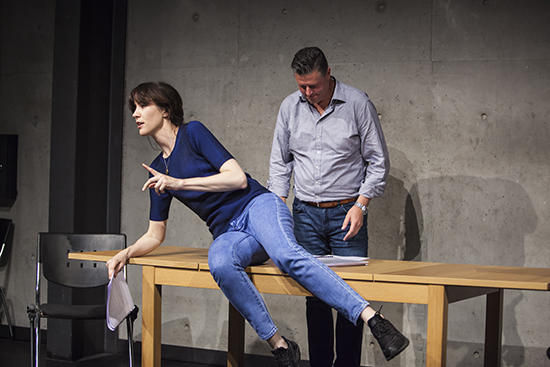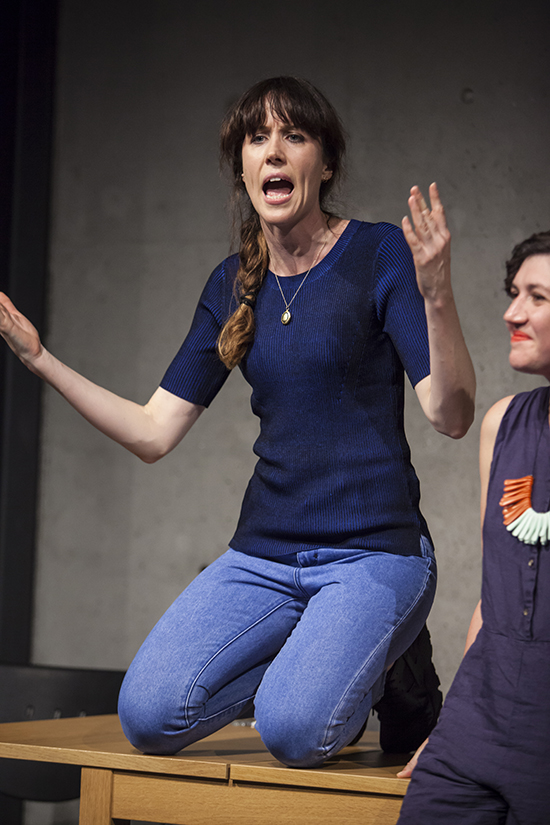On a need to know basis
Keith Gallasch: Mish Grigor, The Talk

Mish Grigor and audience participant, The Talk, Liveworks 2016
Mish Grigor’s The Talk focuses on the frank conversations about sex most of us have likely not had with our families. She successfully persuaded her family (mother and father—divorced— and three brothers) to contribute their memories and feelings about sex as material for a performance, adding to it her own vivid recollections of moments when sex disrupted family life—for instance, one of her three brothers announcing he’s gay and, at a later gathering, that he’s HIV positive. Later again, the family turn on Grigor: the project’s “gone too far,” “you’re passive-aggressive.” But, aggressively, she pushes the family to explosive, cathartic release using a device which she then turns on the audience (and best not revealed here).
These conversations, which provide essential structure, are interpolated with recollections—the ludicrous ‘sex talk’ her father gives her and a brother in the most uncomfortable of circumstances and the hilarious, wince-inducing saga of a lost condom—and one-on-one conversations with her mother and her gay brother. In one of these Grigor becomes her mother listening to her daughter tell her that as a child she could hear her parents having sex and the kind of sex it revealed her mother liked. In the ensuing silences, Grigor’s lips purse, cheeks are sucked in and eyes downcast; it’s painfully funny. The conversation also reveals the sadness of an attractive woman who thinks her “ugly” friends have much happier lives; who, in a conversation with her son, who wants to take her to a gay bar to meet his friends, and where “you’ll be treated like royalty,” is repelled, for now, by thoughts of the aroma of “sex, drugs, farts and Red Bull.”
The Talk is more than fun; it’s a moral quest, with Grigor attempting to understand her own sexuality, one complicated by the lack of talk about it when she was a youngster, the nature of her mother’s sexual enjoyment and her father’s constant nakedness—his large penis setting up unrealistic expectations of the men in her life (“It fucked me up!”). Above all it’s a call for openness, franker than her family expected and perhaps more than some of Grigor’s audience might accept in their own lives beyond being amused by and tolerating others’ honesty, outside the home.
Up until now, you might be thinking I’m writing about a monologue or a fully cast play. Not so. Mish Grigor is determined to implicate this audience in her personal investigation. She has masterfully scripted her recollections and recordings, dextrously sketching family members, subsequently adding telling details (like the revelation that her father identified with a TV soap opera character) and progressing towards honestly facing her attitude towards her gay brother and his illness and staging the work’s aforementioned climax. With the audience seated in a semi-circle facing a few chairs and a table, Grigor gently cajoles individual audience members to sight read, directing them (“speak up”) to play herself and family members, sometimes standing from their seats or more often on stage at the table with her. They do so with varying degrees of confidence, the natural awkwardness amplifying the tentativeness of the recreated conversations.
Grigor’s hosting is relaxed, personable, firm and quick-witted. By the work’s end its many voices become one, deeply felt and touching, before Grigor wickedly turns the tables. The Talk worked for me, prompting some surprising recollections of conversations—awkward, evasive, interrupted, pointless, a few that hit home—and reflections on the evolution of the sexual self. The Talk’s light, inclusive touch packs a punch.

Mish Grigor, The Talk, Liveworks 2016
Performance Space, Liveworks Festival of Experimental Art: The Talk, writer, performer Mish Grigor, collaborating artists Anne Thompson, Jess Olivieri; Carriageworks, Sydney, 2-5 Nov
RealTime issue #135 Oct-Nov 2016






